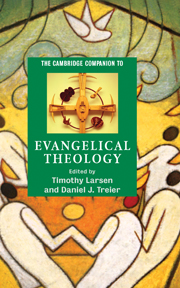Book contents
- Frontmatter
- 1 Defining and locating evangelicalism
- Part I: Evangelicals and Christian doctrine
- 2 The triune God of the gospel
- 3 Scripture and hermeneutics
- 4 Jesus Christ
- 5 The human person in the Christian story
- 6 Justification and atonement
- 7 The Holy Spirit
- 8 Conversion and sanctification
- 9 The church in evangelical theology and practice
- Part II: The contexts of evangelical theology
- Index
2 - The triune God of the gospel
from Part I: - Evangelicals and Christian doctrine
Published online by Cambridge University Press: 28 September 2007
- Frontmatter
- 1 Defining and locating evangelicalism
- Part I: Evangelicals and Christian doctrine
- 2 The triune God of the gospel
- 3 Scripture and hermeneutics
- 4 Jesus Christ
- 5 The human person in the Christian story
- 6 Justification and atonement
- 7 The Holy Spirit
- 8 Conversion and sanctification
- 9 The church in evangelical theology and practice
- Part II: The contexts of evangelical theology
- Index
Summary
“Evangelicals are gospel people”
AN INTRODUCTORY PARADOX: THE DIFFICULT, DIFFIDENT EVANGELICAL DOCTRINE OF GOD
Evangelicals are a people of the gospel (evangel). The good news about what God has done in Jesus Christ for the world presupposes two key theological truths: (1) God has acted (there is something good to report); (2) God has spoken (the news comes from God and so it is utterly reliable). There is no gospel, neither Christological content nor biblical form, apart from the speech and act of God. It therefore stands to reason that evangelicals enthusiastically affirm the God of the gospel, and on one level this is true.
A cursory examination of evangelical theology thus finds nothing exceptional to report: evangelicals agree with the orthodox consensus of the church that God exists, reveals himself in word and deed, and is able to accomplish his gracious purposes. The very logic of the gospel - the declaration that God enables believers to relate to God the Father in Jesus Christ through the Spirit - implies the divinity of the Son and Spirit as well. Hence evangelicals concur with the Trinitarian formula produced by the church fathers in 325 AD - the Nicene Creed - professing belief in one God: Father, Son, and Spirit.
One nevertheless detects a certain malaise in evangelical theology. Though evangelicals did not depart from orthodox affirmations, the doctrine of God languished through much of the twentieth century, mired in a deep funk.
- Type
- Chapter
- Information
- The Cambridge Companion to Evangelical Theology , pp. 17 - 34Publisher: Cambridge University PressPrint publication year: 2007
- 4
- Cited by



